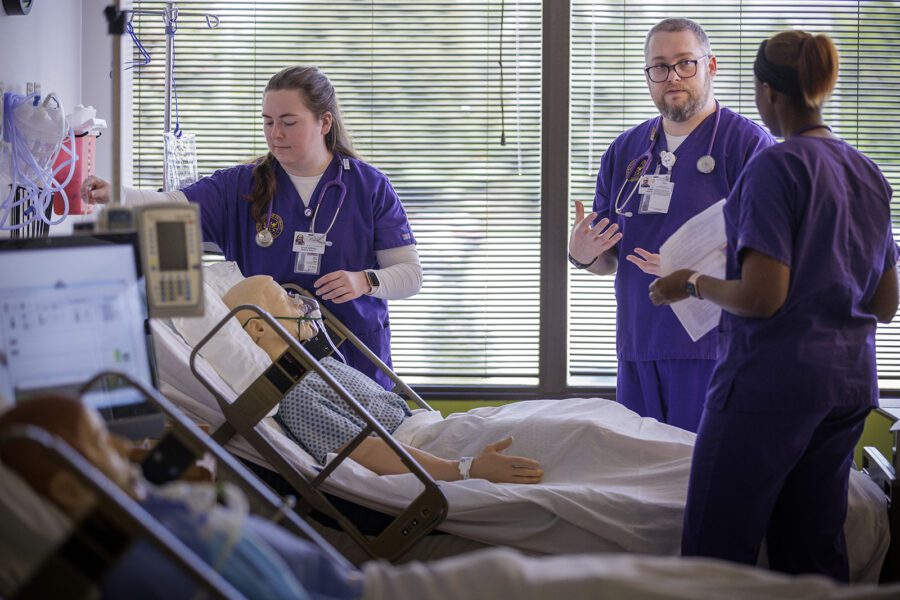

A Brief History of Nursing
For the first few millennia, health care was primarily addressed within the family home or by community members with knowledge of rudimentary healing rituals. Hygienic standards were largely underdeveloped and many people suffered from what modern health care would deem to be avoidable complications (University of Pennsylvania).
Following some advancements made in the mid-nineteenth century in Europe, multiple nursing education programs were established on the East Coast of the United States in 1873. Based largely on the ideas of British nurse Florence Nightingale, the preeminent advocate for nursing education, these three inaugural programs differed in their educational structures—a trend that would remain for the next 80 years (University of Pennsylvania).
Across the world, hundreds of nursing programs followed, seeking to satisfy the need for highly-trained nursing professionals. In the 1960s, the curriculum of nursing education programs became largely standardized—combining theoretical foundations with hands-on health care experiences to enhance patient outcomes by demonstrating both critical knowledge and excellent bedside manner (University of Pennsylvania).


The Modern Landscape of Nursing
One key component of modern nursing education is mentored skills training, often referred to as participation in a preceptor program. A preceptor is an experienced staff nurse who provides mentorship and resources to student nurses during their training rotations through various clinical settings. This format allows nursing students to gain exposure to proper care under the guidance of seasoned nurses (Wolters Kluwer).
A nursing degree heightens students’ understanding of quality health care. Nurses are taught to look beyond physical ailments and address patients as holistic beings. Nursing careers range from traditional practice in a hospital setting to ethical end of life care; from meeting the needs of children in an academic environment to providing critical assistance to doctors by maintaining medical history records (University of Pennsylvania).
The field of nursing is often distinguished by its high-demands, fast-paced work environments, low-flexibility and risk of accelerated burnout. One 2023 report from the American Hospital Association included the statistic that more than 100,000 registered nurses have left the workforce in the last two years, along with a note that by 2027, more than 600,000 more nurses have indicated an intent to leave (AHA).
However, to address these and other industry concerns that have led to nursing shortages in the past five years, many hospitals, unions and health care associations have taken steps in the post-pandemic years to facilitate a more attractive profession. According to a May 2023 report published by McKinsey & Company, significant changes in talent recruitment and retention have changed the landscape for the better (McKinsey). According to the U.S. Bureau of Labor Statistics, there are more than 3 million registered nursing jobs in the U.S. and the median salary for registered nurses in 2022 was $81,220.


Is going to school for nursing the right choice for me?
Before enrolling, the opportunity cost of investing time, money and effort in a nursing program should be calculated. Consider the following:
- What are my career goals and how will this program help me achieve those?
- What are the short- and long-term benefits and tradeoffs?
- What type of curriculum delivery (in-person, online or hybrid) is best suited for my needs as an adult learner?
- Do my skills and talents orient me toward a job that is focused on patient and family care?
Purposeful Advantages—Nursing at Olivet
Olivet Nazarene University offers a spectrum of nursing programs, all of which meet the quality standards of the Commission on Collegiate Nursing Education and Illinois Department of Financial and Professional Regulation. Depending on previous academic and professional experiences, students at Olivet can choose to pursue a bachelor’s or master’s degree in nursing, post-graduate certificates (FNP, Nursing Education, Transformational Leadership) or the Doctor of Education: Ethical Leadership degree.
For those just entering the field of nursing, a bachelor’s degree at Olivet not only provides theoretical knowledge through classroom engagement and practical application through clinical rotations, but also prepares students for the National Council Licensure Exam (NCLEX). Graduates of the School of Nursing at Olivet Nazarene University have consistently exceeded the national average pass rate for the NCLEX-RN. The excellent preparation for professional licensure continues at the graduate level. Olivet’s Master’s of Science in Nursing: Family Nursing Practitioner (FNP) program announced in April 2024, a 100% first-time pass rate of the 2023 national American Nurses Credentialing Center FNP certification exam.
Nursing was first offered as a field of study at Olivet in 1967. As of April 2024, Olivet has graduated 6,102 candidates from the undergraduate and master’s level School of Nursing programs over the years. The University still offers a traditional on-campus bachelor of science in nursing degree, but has also evolved to offer hybrid and online programs and certificates to maximize accessibility for adult learners. Additionally, the nursing programs at Olivet are competitively priced to meet the needs of students.
One of these programs, the accelerated RN-BSN program, operates on a rolling admissions basis. General education online courses begin every eight weeks and all classes meet online. On average, the RN-BSN program takes 16 months to complete the 24 credit hours and 45 required practicum hours necessary for graduation.
Olivet Nazarene University has been recognized as a college of distinction by a range of organizations including U.S. News and Colleges of Distinction. In 2023, the School of Nursing was specifically ranked as the No. 1 Best Online RN-BSN program in the state of Illinois by RegisteredNursing.org.
For more information on Olivet’s accredited nursing degree programs, visit olivet.edu/nursing.
Referenced articles:
- University of Pennsylvania (https://www.nursing.upenn.edu/nhhc/american-nursing-an-introduction-to-the-past/)
- Wolters Kluwer (https://www.wolterskluwer.com/en/expert-insights/9-qualities-of-effective-nursing-preceptor-programs)
- McKinsey & Company (https://www.mckinsey.com/industries/healthcare/our-insights/nursing-in-2023)
- U.S. Bureau of Labor Statistics (https://www.bls.gov/ooh/healthcare/registered-nurses.htm)
- American Hospital Association (https://www.aha.org/news/headline/2023-04-13-study-projects-nursing-shortage-crisis-will-continue-without-concerted-action)





